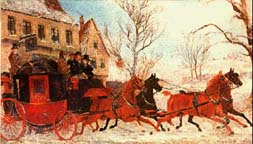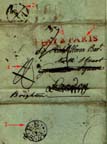These letters graciously have been shared with the Victorian Web by Eunice and Ron Shanahan; they have been taken from their website. The letters give an insight into the daily lives and concerns of 'ordinary' people without whom history would not exist. The letters are a wonderful example of how much history may be gleaned from such sources.
This is the first of two letters written in 1792 from Paris to London, both addressed to Sir Richard Heron, Baronet, of Grosvenor Square. The second letter was written on 20 March
The first one is dated February 6, and it has five postal markings
[Click on the thumbnail for a larger image.]
- in red P. PAYE PARIS, which indicated that the only postage due would be the inland postage from the first port in England to London. When it reached London it received:
- the Foreign Office Bishop mark for February 9. This type of Bishop mark was in use in both the Inland and the Foreign Office which are identifiable by the position of the month and day. The Foreign Office always had the month above the day. The letter was re-addressed to Brighton, so it was transferred to the Inland Office, where it received
- an Evening Duty double-circle datestamp for FE 10 92 and
- the postal charge of 10d which was crossed out, and
- a manuscript '4' charge mark added. The postage of 10d was paid to cover the cost from Paris to London, but as it had to be re-directed, the cost of London to Brighton (58 miles) had to be collected from Sir Richard Heron.
The letter carries a note 'Recd 11th Febry at Brighton, so it only took the extra day.
Monsieur Lescallier writes from
Paris 6th Feby, 1792
"Dear Sir,
I inform you of my next departure from hence for Lorient which will take place within this month, and perhaps just after receiving news from you, if you are so kind as to answer quickly. I have wrote to you of our ministerial notification being made, and required you to see into the execution of your good and friendly purposes towards me.
I have asked for some books relative to the India affairs or languages, and today ask for some more from my friend D. Elmsly. I hope he will forward them without delay by the Paris Diligence, which sets out from Piccadilly, the Hay-Market end. If you can do something towards hurrying him, you will greatly oblige me.
Believe me, still and for life, with a sincere respect and affection
Dear Sir,
your most obedt. Humble servt.
Lescallier."
 The
London Mail
The
London Mail
I find it astonishing that in 1792, a Frenchman living in Paris should be so familiar with the coaching system in London, that he not only knew of the Paris Diligence — the fast coach which ran daily to the south coast of England to catch the packet boats for the continent, but also knew the exact departure point.
In view of the fact that Sir Richard was not in London when he received the letter, but in Brighton, I wonder if he was able to 'hurry up' Mr Elmsly.
From the date of the next letter, it seems he had six weeks to act. Also, I cannot imagine why he would be asking for books 'relative to the India affairs or languages' when he is going to Lorient, which is a French port. However, there is an interesting spelling in the second letter — L'Orient instead of Lorient. Did this indicate that Mr Lescallier was, in fact, going 'to the Orient' which would explain his request for Indian information?
Graham Clark in England then sent the following information
The important person is not, as you might think, Sir Richard Heron, Bart. His dates were 1726-1805. He was the 1st Baronet and Chief Secretary to the Lord Lieutenant of Ireland at the time of Lord Buckinghamshire (Dec 1776 — Nov 1780). However, Lescallier is a different story!
First of all his dates are 1743-1822. Daniel Lescallier was an author, publishing primarily books on maritime subjects [listed at the bottom]. Later he also published a couple of books on aspects of French colonial life. The significant link to your letters is the name P. Elmsly — he was the London publisher of two of Lescallier's works, in 1783 and 1791. This may well explain how he knew about the Paris Diligence in such detail — he clearly would have had a lot of correspondence with Elmsly over the years and may well have visited London on business too. On your letter page you have it as D. Elmsly — could this be a 'P' instead? Peter Elmsly was quite a prominent publisher in the Strand during that time period.
However, this aspect of his life is not the exciting part! Your first letter refers to his imminent departure for Lorient following ministerial notification and his desire for books on India. Well, I can tell you EXACTLY what this was all about! Lorient is in southern Brittany also formerly known as L'Orient — it was the port for ships sailing to the east.
In 1792, Daniel Lescallier was sent as an envoy of the National Assembly to deal with a 'revolution' at Chandernagor, an island town now part of Calcutta in India. He arrived there in October 1792 via Pondicherry. At that time both Pondicherry and Chandernagor were among about half a dozen French 'colonies' in India having been settled in 1686.
Escallier was termed a 'Civil Commissioner'. There was no blood shed and he and his fellow envoys apparently calmed things down. But in 1793 a ship transporting the ringleaders back to France was seized by the British who freed everyone and also decided to take over Chandernagor. Eventually it went back to the French before finally being ceded back to India in the 1950s.
This was almost certainly the trip that is mentioned in your letters, although whether the 'revolution' I mentioned was the initial reason for going to India is not clear as it only came to a head in September 1792 — trouble may have been brewing for a while I guess. Daniel Lescallier went on to greater things on his return, however. By 1799 he was Maritime Prefect in Lorient. In 1801 he became Colonial Prefect in Guadeloupe in the Carribean. In 1805, he returned to France to become Maritime Prefect at Genes (now Genoa in Italy) and later at Le Havre. He was made Commander of the Legion of Honour in 1805. He was the French Consul in New York at some point too.
He is mentioned in a couple of Napoleon's letters to the Minister for Marine and Colonial Affairs. A letter of 22 April 1800 mentions that on 6 May the 'Conseiller d'Etat' Lescallier will be leaving from Paris to join a fleet of 7 warships and 5 frigates leaving with 4000 men for Santo Domingo — this is presumably him on his way to take up his post in Guadeloupe. A second letter on 7 March 1801 to the Minister for Marine and Colonial Affairs says that he read with greatest attention the report from Citizen Lescallier and to please let him know how satisfied he was with the details he was providing.
It would seem he retired from public life after 1810 — he would have been about 66 or 67 after all).
Publications of Daniel Lescallier
- Vocabulaire des termes de marine anglois et françois, en deux parties: orné de planches, avec une explication des figures qui y sont contenues, & des définitions de quelques termes de marine, principalement ceux de gréement. (Paris, Imprimerie royale, 1777. 2 v. in 1, ill., 26 cm.)
- Vocabulaire des termes de marine anglois et francois, en deux parties; Orné de Planches, avec une Explication des Figures qui y sont contenues, & des définitions de quelques Termes de Marine, principalement ceux de Gréement. (Nouvelle edition. P. Elmsly, London, 1783 (new ed.). 2 vols, 8vo, xvi, 96 pp, 4 fold. plates & 279 pp, 27 fold. plates.)
- Réflexions sur le sort des noirs dans nos colonies. ([n.p.] 1789. 71 p. ; 20 cm.)
- Mémoire sur la Marine. (Paris, Clousier, 1790. iv, 82 p. 27 cm.)
- Traité pratique du gréement des vaisseaux et autres batimens de mer. (Paris, Clousier, F. Didot; London, P. Elmsly; Amsterdam, G. Dufour, 1791. 2 v. in 1 (xxiv, 488, [8], 83, 23 p., 34 leaves of plates (5 folded)): ill.; 27 cm.)
- Exposé des moyens de mettre en valeur et d’administrer la Guiane. (Paris, Du Pont [1798]. xxiv, 237 p. fold. map. 22 cm.)
- The Method for Draining Lands Overflowed by the Tides, such as is Practised at Surinam and Demerary. (Roseau pamph, 1802. By the Prefect of Guadeloupe. A translation of a French 1791 work.)
I am indebted to Graham for all this information, and hope that it will help
anyone else who is researching any of these names.
Graham has given me information about other letters that are on the web, which
is proving to be a really valuable source of contact for exchange of knowledge.
3 December 2002
